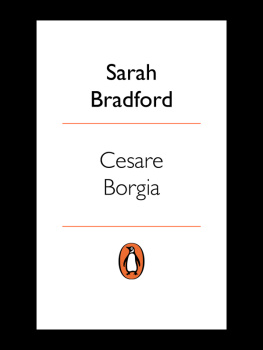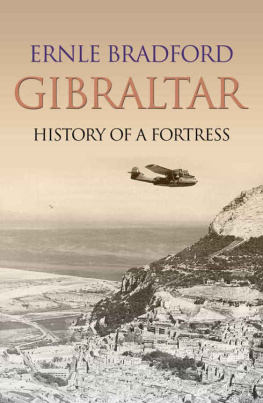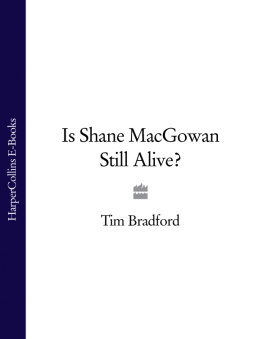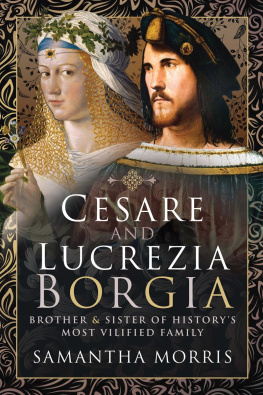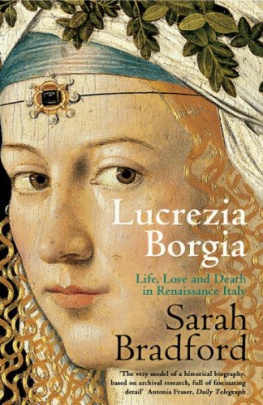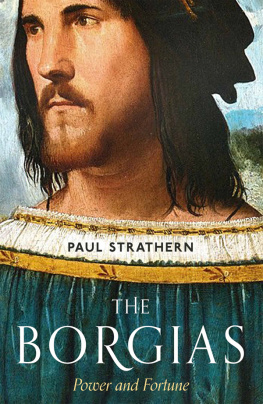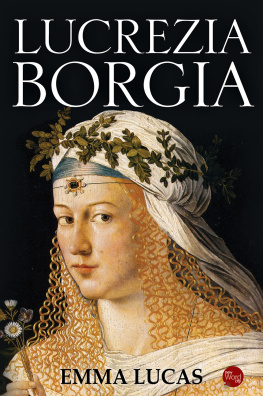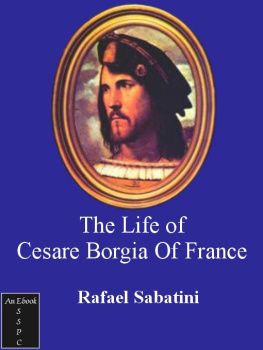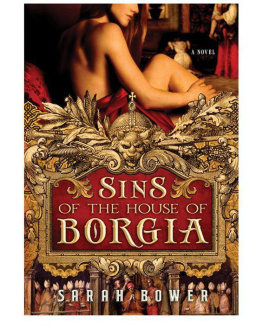
SARAH BRADFORD
CESARE BORGIA

HIS LIFE AND TIMES

PENGUIN BOOKS
CESARE BORGIA
Sarah Bradford is a historian and biographer. Her books include Cesare Borgia (1976); Disraeli (1982), winner of the New York Times Book of the Year; Princess Grace (1984); Sacherevell Sitwell (1993); Elizabeth: A Biography of Her Majesty the Queen (1996); America's Queen: The Life of Jacqueline Kennedy Onassis (2000); Lucrezia Borgia (2005) and Diana (2007). She frequently appears on television as an authority on her biographical subjects and as a commentator on notable royal events. She is currently working on a biography of Queen Elizabeth II, to be published in Viking in 2012, and a full-scale biography of Queen Victoria. She lives in London.
Introduction
The Borgia Legend
C ESARE B ORGIA s name has been a byword for evil for over five centuries.
He was born, the illegitimate son of the Spanish Cardinal Rodrigo Borgia, later Pope Alexander VI , into a world which has been called the Golden Age of Bastards. The princely courts of fifteenth-century Italy swarmed with the rulers children struggling for a career through war, the Church, marriage or, not infrequently, assassination. The wicked custom of poisoning men, wrote the great Florentine historian Guicciardini, is a common practice in many parts of Italy. Life was short; time pressed on ambitious men.
Wielding the sword and backed by the power, wealth and prestige of the Papacy itself, Cesare at twenty-seven became the most feared, hated and envied man in Italy, earning himself the reputation of the terrible Valentino. Each of the princes and states in turn felt themselves menaced by his growing ambition, and his threat to the Italian political establishment generated a sense of shock and outrage which formed the basis of the Borgia legend.
This legend arises from the pages of contemporary accounts of the Borgias, the stuff of a sinister reputation that has shadowed them, and Cesare in particular, down the ages. Cesare was accused of murder, rape, incest, robbery and treachery much the same charges which were levelled at his father the Pope. There were elements of truth in these accusations, but contemporary reactions to the Borgias were not based solely on moral grounds. It was an age in which the standards of public and private morality were far from strict: double-dealing and intrigue were regarded as an integral part of the game of politics and war, political assassination was common, and Alexander VI was not the first pope to have had a hand in it.
Most of the Italian lordships were founded upon violent conquest, and violence remained very much a part of political life. In the cities of Italy the factions fought each other bloodily in the streets, the Baglionis against the Oddis at Perugia, the Orsinis against the Colonnas in Rome. The pursuit of the vendetta, either as an act of personal vengeance or by the use of hired assassins, was an accepted custom; Cellini in his autobiography boasted of the many fatal brawls in which he had been involved.
Violence and murder were equally common in the private lives of the Italian signorial families. Sigismondo Malatesta of Rimini had two of his wives murdered: one poisoned, the other suffocated. Francesca Manfredi of Faenza lured her husband into her bedchamber on the pretext of being unwell and had him stabbed there by concealed assassins; when they bungled the job she coolly stepped forward, a fifteenth-century Lady Macbeth, and finished him off with a dagger thrust in the stomach. In July of 1500, in a bloodbath known as the Red Wedding, half the feuding Baglioni family of Perugia murdered the other half in their beds, a massacre which was quite overshadowed in contemporary chronicles by a single act of violence committed by Cesare at the time.
Sexual licence applied to laymen and clerics alike. The great lords had numerous mistresses who might be of noble or common birth, courtesans or married women, and broods of bastards who were brought up at their courts side by side with their legitimate children. The great churchmen behaved in the same way: Pope Sixtus IV s nephew, the flamboyant Cardinal Pietro Riario, kept a mistress whose shoes were sewn with pearls; of the Renaissance popes both Innocent VIII and Julius II as well as Alexander VI had illegitimate children A thriving population of whores serviced the swarming clerics in Rome, and the conventual orgies described in Aretinos I Ragionamenti were not figments of the authors imagination. Incest and sodomy were accepted, though officially frowned upon: Gian Paolo Baglioni of Perugia received ambassadors while lying in bed with his sister; Sigismondo Malatesta, whom Pope Pius II called the worst scoundrel of all the men who have ever lived or ever will live, the disgrace of Italy and the infamy of our times, was alleged not only to have committed incest with his daughter but to have attempted sodomy with his son. Yet it was for heresy, not sexual misdemeanours, that the same Pope later excommunicated him.
Why then has Cesare Borgia come down to us as the archetype of criminality? The hostility of his Italian contemporaries towards him and his family can be partially explained on the grounds of their Spanish blood. Italians disliked and despised all foreigners, whom they regarded as barbarians, and Spaniards most of all with good reason. In Italy, where the Aragonese dynasty ruled Naples and Sicily, Spanish soldiers of fortune had already displayed that combination of courage, pride, endurance, ferocity and greed which was to drive the conquistadors on their bloody progress through the New World. From the pages of Aretino it is clear that the Spaniards in Rome were looked on as a kind of Mafia, and it is probable that the great families of Italy saw the Borgias in that light. Marrano, secret Jew, was the epithet most commonly thrown at Spaniards in Italy, and one which Cesares enemies frequently used to describe him.
Racial prejudice, however, is an insufficient explanation for the devil-figure which Cesare represented to his contemporaries; it is their constant references to his dangerous nature which give us the clue. Cesare Borgia was a dangerous man, with one quality above all which made him so: a driving ambition which was the key to his whole life, the underlying theme of his complex character. He was one of those rare men born with a superlative ambition to which all else was subordinated, a quality which makes a man a maverick among his fellows, and a threat to the normal tenor of their lives. Moreover Cesare deliberately created his own myth by calculated acts of terror, veiling his life in a secrecy which gave his sudden brutalities and lightning moves added impact.
Cesares character was bewildering in its contradictions: he was a brilliant student, a man of lucid intelligence, possessed of notorious charm and eloquence of his mind and tongue he makes what use he wills, one despairing envoy wrote of him. He was strong, athletic, an expert horseman and a skilful military leader. Even his enemies never denied his personal courage: In war he was a good companion and a brave man, a French fellow officer recorded of him. He was also totally amoral, vengeful, treacherous and deceitful, the great dissembler as Machiavelli described him, a man apparently incapable of deep and lasting human affection except perhaps for his sister, Lucrezia. His complexities baffled even that acute observer Machiavelli, who saw the careful picture he had built up of Cesare shattered in an hour, so that he doubted whether it had been the truth or simply a mirage.
Next page
